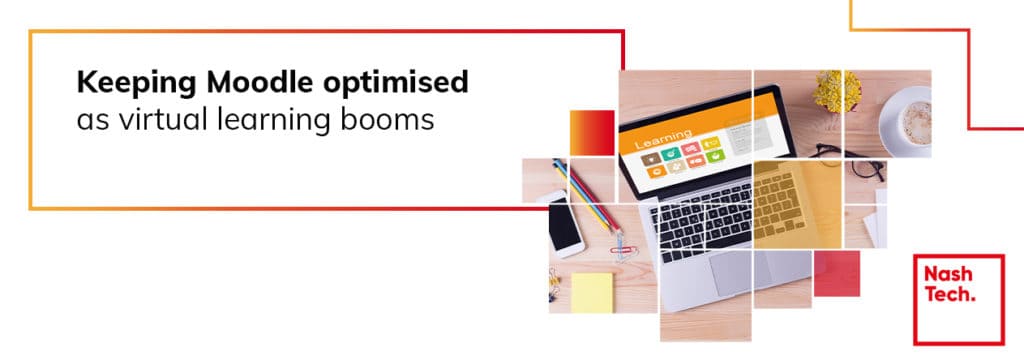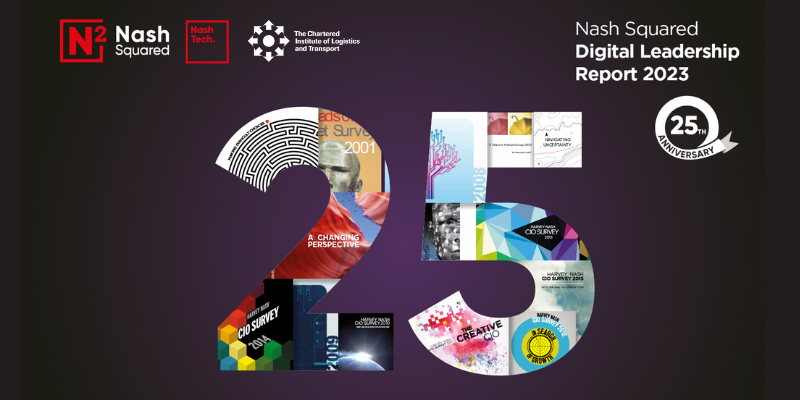Home / Our thinking / Insights / Keeping Moodle optimised as virtual learning booms
Keeping Moodle optimised as virtual learning booms

Table of contents
The Covid-19 pandemic has hugely accelerated the growth of virtual learning, with higher education campuses up and down the country largely empty and students working remotely from bedrooms, studies and kitchen tables. As (hopefully) the pandemic eases and the recovery begins, we are likely to see evolving hybrid models with much more widespread use of virtual learning environments to effectively deliver learning content.
Virtual or remote learning has been a growing part of the learning experience for some time – but in the new world it has become a higher strategic priority than ever before to ensure that digital learning platforms enable students to learn effectively, sitting alongside face-to-face teaching as a core part of the student learning experience.
The growth of Moodle
One of the most widely used VLEs is Moodle. Indeed, it describes itself as “the world’s most popular learning management system” with some 262 million users worldwide. There are 181,000 registered Moodle sites globally and nearly 5,000 in the UK. The Open University for example uses several award-winning Moodle instances for both its free/open and undergraduate courses serving its 200,000 users. But it is by no means only universities and education institutions that utilise Moodle – a wide range of corporates and other organisations leverage the open-source platform to bring learning programmes to staff and other stakeholders. The government’s Civil Service Learning platform runs via Moodle and serves half a million employees.
Emerging trends
As usage of Moodle and focus on remote or distance learning expands, it has become increasingly critical to invest in, manage and evolve the learning experience. Platforms must be continually updated and optimised, as well as scalable to cope with heavier traffic and periods of peak demand. It is vital to deliver a compelling learning experience, and increasingly, a more data centric and personalised approach to improve learning outcomes and levels of satisfaction. The virtual learning environment is also a key point of differentiation in a highly competitive market. Therefore, should be central to any transformation strategy. This has given rise to a number of trends amongst higher education institutions.
Cloud migration
The most notable is migrating Moodle instances to the cloud. Although running Moodle through on-premise servers is viable, it can nevertheless bring a number of operational challenges which have become increasingly visible as demand patterns have changed during the pandemic. On-premise systems often lack the scalability to efficiently deal with spikes in demand, meaning remote users may suffer from poor responsiveness, or lack of availability.
Migrating to the cloud holds several advantages. Scalability and speed of responsiveness are the most obvious, but in addition it can reduce the cost of infrastructure for an institution as the number of servers processing data and requests can be scaled up and down in line with demand. It also enables more responsive off-site development, support and maintenance. Cloud brings the possibility of greater levels of automation through established providers such as AWS and Azure. Security best practices are built in too, offering robust user data privacy and content protection controls.
Plug-ins and testing
With hundreds of available plug-ins, another issue we’re seeing is that testing can become a time consuming and prohibitive challenge for both major and incremental version upgrades. Automated testing solutions can make a significant difference here and, in some cases, automated testing can reduce the time needed for regression testing by as much as 50%.
Content management
In addition to the environment itself, the content management system (CMS) is also an important element to consider. Changes to CMS, and even versions of CMS, must also be carefully considered for both optimising content delivery, or avoiding deprecated software issues.
Headless CMS
An emerging trend is the move towards a ‘headless’ or decoupled CMS. Whereas a traditional CMS typically controls both the front and back end of a website, a headless CMS only covers back-end components, with the front end decoupled and connected via an API layer. This significantly increases options for the display of content including third party integrations and custom-developed platforms. By separating the frontend, the backend is able to focus more on the content type and data, as well as increase tracking and reporting capabilities. There is potential through headless CMS, to better serve multiple types of learners, including those with disabilities, and furthermore adapt the service to better fit different environments, such as mobile applications.
Data, machine learning and personalisation
There is huge potential to apply artificial intelligence and machine learning to improve the learning experience, by providing more personalised content and teaching approaches. Students can be profiled based on their results, previous work and a range of other factors, to predict progress and identify students who would benefit from additional attention or are even at risk of disengaging. The experience is further enhanced by additional tools such as chat bots, providing extra help 24/7. Recommendations suggesting courses, content and information based on what is currently trending or on individual learning history and similarities with other student profiles is also possible.
Content authors can be supplied which a range of additional tools to save time and help with the content creation process. Suggestions can be given for optimal module and activity duration suggestions and module structures, as well as what difficulty level to assign to a course. Efficiency can also be increased through automated video speech transcripts and image analysis for caption generation. Furthermore, social media text analysis can help authors to identify trending content that they may find useful providing authors with up-to-date content ideas that their students will find relevant.
Drupal 8 deprecation
A further topical issue that institutions are dealing with is the deprecation of Drupal 8 functionality planned to take place in November 21. Drupal is often integrated with Moodle and organisations using earlier versions need to develop a thorough strategy for migrating to the newer, supported Drupal versions without causing downtime and interruptions to their Moodle service.
As Drupal 8 support ends in Nov 2021, migration to Drupal 9 is recommended to support security and 3rd party dependencies updates. Most of the deprecated functions or APIs in Drupal 8 will be removed in Drupal 9. This will have a big impact on both the features, modules and themes that are used inside Drupal, as well as the features that integrate with Moodle, such as course details and enrolment.
For the latest upgrade from version 8 to 9, we can simply remove the deprecated code. If the existing platform is the latest version of 8, we can update the deprecated part, then focus more on the development of Moodle integrated features. Alternatively, if it is an earlier version of 8, we will focus on the version migration first by scanning and updating the deprecated function using Drupal-check plugin, before conducting regression testing on the Drupal site.
Finding the right partner
Finding the right partner to support the development of your Moodle platform is a key investment. At NashTech, we have extensive experience in developing, optimising and supporting some of the world’s leading Moodle implementations, including several leading higher education institutions and distance learning organisations.
Services are delivered by an expert technical team based in our offshore centres in Vietnam and backed up by onshore / local based delivery management and account teams. We work in a spirit of collaboration, partnership and agility, alongside our clients internal teams to develop solutions that optimise the student learning experience, improve outcomes and meet the evolving demands of today’s digital learning needs.
To discuss any aspect of your Moodle or other VLE platform, just send us an email to info@nashtechglobal.com.
Suggested articles

Is machine learning that complex to understand?
Nowadays, while surfing the Internet, you can bump into many academic definitions of machine learning (ML). Take one typical explanation from...

Exploring use cases of AI in higher education,
How is artificial intelligence transforming higher education and how can institutions capitalise on its impressive technology for enhanced student...

The role of machine learning, data and artificial intelligence in logistics
Short on time? Here are the key takeaways: The value creation of AI in logistics is immense; transforming operations in the warehouse and supply...